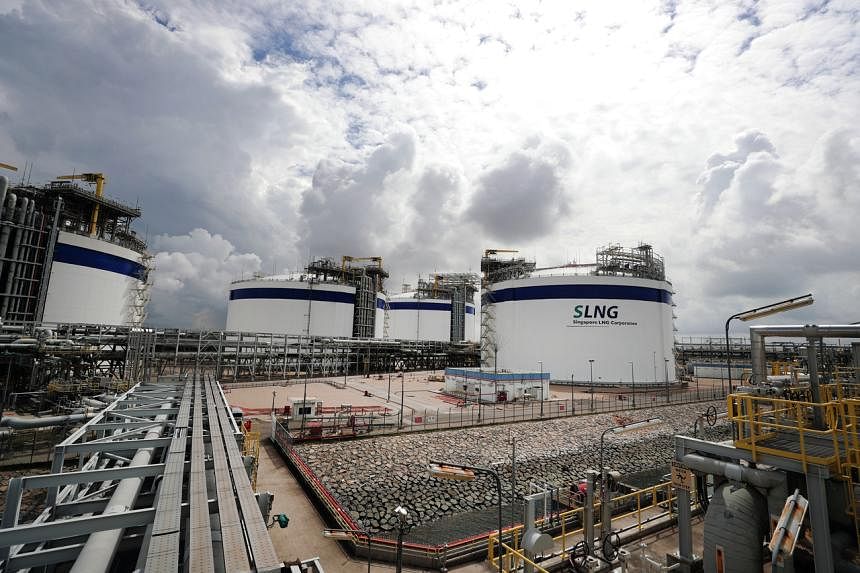SINGAPORE - Singapore should consider setting up a strategic reserve facility for diesel, an important alternative fuel for power generation, industry sources said.
Power security has emerged as a key issue in the wake of the Ukraine conflict, and has once again turned the spotlight on energy security here in Singapore, which depends on imported natural gas for about 95 per cent of its electricity needs.
Singapore relies on piped natural gas from Indonesia and Malaysia. Since 2013, it has been importing liquefied natural gas (LNG) to further boost its energy security, via the terminal it launched in 2013. The country gets its LNG from a number of sources, including the United States, Qatar and Australia.
The Energy Market Authority (EMA) told The Straits Times in August that the power generating units that run on gas as the primary fuel are also designed to use diesel as a backup fuel.
The units have the ability to "hotswitch" to diesel in the event of any gas supply disruption to ensure power supply continuity.
Mr Jorge Montepeque, chief executive of consultancy Global Markets, said that while the move to build diesel inventories did not make commercial sense considering the current market structure, it would be prudent for Singapore to do this at a national strategic level because of the uncertainty surrounding global energy supply.
"The blowing up of the gas pipelines in Europe shows us that there is no assurance of forward supply, meaning we cannot assume that supply will be available in the future when you want it," said the oil industry veteran, who designed how the global oil market is priced and traded over a 27-year career at S&P Global Platts.
Mr Montepeque, who was also formerly head of origination for Italian oil producer ENI, said: "Every single supply source is now technically at risk, so it is only prudent for a government or a sovereign state to have its own inventories and be prepared in the event of a widening war."
European Union states, once heavily reliant on Russia for energy supply, are now trying to find alternative gas supplies. The EU has ascertained that major leaks from two key gas pipelines running deep in the Baltic Sea last week were the result of sabotage.
The Nord Stream pipelines, which were not pumping gas to Europe but had gas in them when the leaks were found, have been flashpoints in an energy stand-off between the West and Russia since its invasion of Ukraine, fuelling a cost-of-living crisis.
As a result of rising gas prices and constrained supply, demand for diesel, a heating fuel commonly used during the winter, is now expanding.
More than 40 per cent of Europe's diesel supply comes from Russia, but stinging sanctions and an impending embargo on Dec 5 and then in February are expected to further choke off supply. The sanction coming into play in December will be for Russian crude exports, while the February embargo will cover refined petroleum products such as diesel and fuel oil.
Mr John Driscoll, managing director of consultancy JTD Energy Services, said front-loading diesel supply now was probably a smart move for Singapore, should it decide to establish a reserve fuel facility at a national level.
The Singaporean also noted that the Government was already doing this with LNG, having set up a similar facility for the power generation companies to draw on, should the need arise or supply gets disrupted.
"The volatility we see with LNG prices now makes it harder for buyers to mitigate risk; furthermore, we should not take the availability of supply for granted. Energy infrastructure is extremely vulnerable now and you have to prepare for the worst," said Mr Driscoll.
Mr Yaw Yanchong, director of oil research at Refinitiv, a unit of the London Stock Exchange Group, continues to maintain the view that the race to secure diesel supplies will start to heat up once the ban on Russian petroleum product purchases kicks in next February.
"We have said for a few months now that the underlying bullishness of the oil market is due to the uncertainty surrounding diesel supplies, with China still not yet exporting despite receiving the national mandate from the government to expand their exports. There remains a lot of uncertainty in the market over availability of supply," he said.
Ms Serena Huang, lead analyst at data intelligence firm Vortexa, said middle distillate inventories globally that include, diesel, jet fuel and kerosene were well below five-year average levels and that there was a limited buffer against any supply shocks.
"This is definitely a concern for the market, and with rising uncertainties around Russia's gas supplies to Europe, we can expect more gas-to-oil switching by Europe this winter. Europe is running against time to stock up on diesel," she said.
Ms Huang said diesel supply trading into Europe had risen for the sixth consecutive month to 1.85 million barrels per day (bpd) in September.
She noted that this momentum was expected to continue in the coming months.
Around half of Russia's petroleum product exports went to Europe before the Ukraine war, noted the International Energy Agency (IEA), but sanctions imposed by Western powers on Moscow's energy shipments have caused severe supply disruptions and sent fuel and electricity costs to historic highs.
The impact is felt globally as European states scour the world for alternative supplies.
In Europe, gas-to-oil switching for power generation has also added to the usual seasonal demand for winter fuel. In August, the IEA said it expected European gas-to-oil switching to boost oil demand by 300,000 bpd over the next six months.


